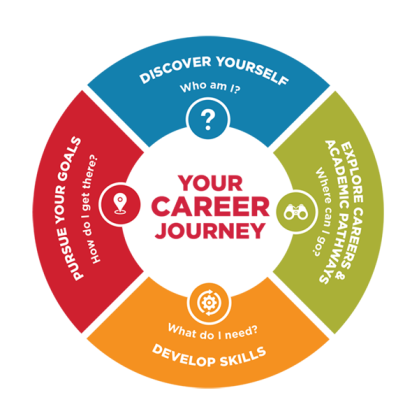The Career Journey Model
Two of the biggest decisions you will face at Rutgers are deciding what to study and what to do once you graduate. These are important decisions that require thoughtful consideration. Some students identify their choice of major and/or career early on, while others need more time to explore and research various options. The career journey model provides a framework for students to understand their own career development journey and specifically, where they are in the process. Each of the phases of the circular graphic below represents important elements of your journey and corresponds to specific tasks or goals. The model is circular because it represents an ongoing process with no specific chronology. This is a process you will revisit throughout your life, particularly when your goals change. Understanding the phase you are in and how to access the best information available will help you feel more confident with your career decision making. Ultimately, your choice of career will be the result of various experiences and not the result of one isolated decision.
Career Journey Model

Accordion Content
-
Learning about yourself including your interest, what you enjoy studying, what you do well, how you fit in certain work environments, and what motivates you are important in the self-discovery process. CES offers various career assessments and resources to begin this process.
Take First Steps
- Meet with a career advisor
- Take a career assessment
- Attend the major and minor fairs
Focus on Academics
- Set up a study schedule
- Attend all classes; don’t sit in the back
- Utilize tutoring services
Network
- Create a professional LinkedIn profile
Get Involved
- Attend involvement fairs
- Find a group of friends
- Join at least one student organization
Recommended
-
There are a broad range of academic disciplines and career options available to you. CES can help you explore what career options align with your interests and connect you with the various academic pathways that can lead you there. Use all of the available resources to explore and narrow your choices including attending the SAS major/minor fair, connecting with alumni in fields of interest, exploring career interest communities, and more.
Select Your Major(s) & Career Community
- Declare your major
- Select a career community in Rutgers Handshake
- Develop relationships with faculty & administrators
Take a Leadership Role
- Become more involved by serving on a committee or obtaining a leadership role Prepare for the Internship Search
- Create a resume and get it critiqued
- Identify internships of interest
- Prepare for interviewing
Recommended Online Tools
-
Developing skills is an important step in making you marketable to future employers. For the most part, employers are more focused on the skills a candidate has and not on a specific major. Getting involved in experiential education opportunities like participating in a student organization, volunteering, conducting research, and interning at an organization are critical in building skills and testing areas of interest.
Explore Specific Careers & Graduate Programs
- Narrow your career focus
- Explore graduate school & talk to faculty
- Identify graduate school & internship search resources
Network
- Attend networking events
- Utilize the Student-Alumni Career Connect System
Find an Internship
- Apply to internships
- Consider earning credit for your internship
- Stand out at your internship
Recommended Online Tools
- Big Interview Resume AI
- Student-Alumni Career Connect System
-
Take action to prepare for the next step in pursuing your goals, whether it is applying for graduate school or navigating the full-time job market.
Apply for Jobs and/or Graduate Programs
- Prepare application materials
- Consolidate your post-graduation strategy
Prepare for the Transition from College to Career
- Make an impact at your first job out of college
- Adapt to a new work schedule
Maintain Networking Contacts
- Stay connected with faculty and colleagues after you leave
Recommended Online Tools